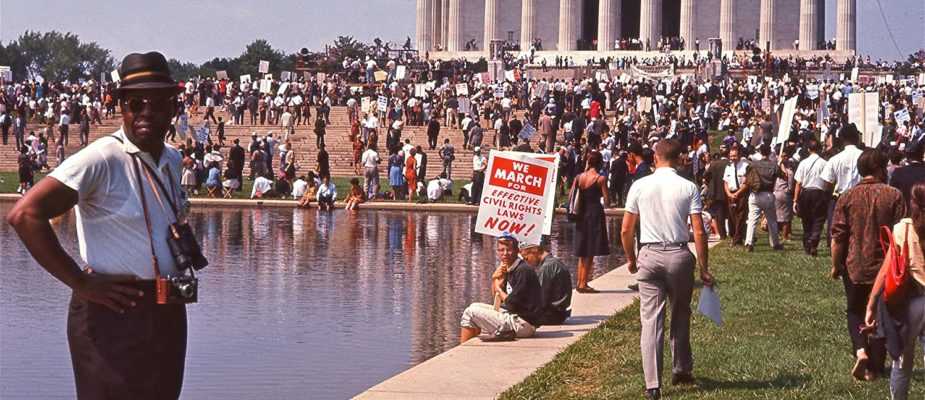In celebration of Juneteenth, we’re honored to recommend a selection of our favorite films by African-American and Afro-Caribbean directors. Running the gamut from experimental nonfiction to realist drama, from romantic comedies to horror films, from Oscar winners to low-budget indies these entertaining, eye-opening, beautifully crafted features—many of which made their local debut in OKCMOA’s Noble Theater—are all available to watch at home.
Several of these films can be streamed free-of-charge through the Metropolitan Library’s Kanopy service or through the Criterion Channel, which recently removed the subscription paywall from a set of classical and contemporary masterworks that focus on the dreams, struggles, desires, and art of black characters and real-life subjects. Click to access the full list of films available in the Criterion Channel’s Black Lives series, streaming free throughout the month of June.
* * *
Black Mother (Khalik Allah | 2018)
Available to stream via Amazon Prime and Criterion Channel
Voted the best undistributed film of the year in the 2018 IndieWire Critics’ Poll, Khalik Allah’s (cinematographer of Beyoncé’s Lemonade) visionary documentary Black Mother is a loving and lyrical portrait of Jamaica and its people, a visual poem that is at once a deeply felt love letter and an ecstatic street-corner prayer. From red light districts to lush rain-forests, Allah introduces us to a succession of vividly rendered individuals who call the island home. Their candid testimonies create a polyphonic symphony, set against a carefully constructed, rhythmic montage of indelible and starkly beautiful images. Thoroughly immersed between the sacred and profane, Black Mother channels rebellion and reverence into a deeply personal ode, one informed by Jamaica’s turbulent history but existing in the urgent present.
Daughters of the Dust (Julie Dash | 1991)
Available to stream via Kanopy and Criterion Channel
Released in 1991, Julie Dash’s independent feature Daughters of the Dust was the first film directed by an African-American woman to secure theatrical release in the United States. It unfolds in the summer of 1902 as members of the Peazant family prepare to leave their home in the Sea Islands and seek a new life in the North. Grounded in the multi-faceted relationships that bind three generations of Peazant women across time and space, Daughters of the Dust is a richly cinematic evocation of the distinctive Gullah culture that emerged in the Low Country regions of Georgia and South Carolina after the end of the Civil War. It is also a powerful meditation on cultural heritage, religion, and the pernicious legacy of American slavery. Praised by critics and scholars for its singular voice and vision, the film’s dreamlike, lushly poetic style recently served as the inspiration for Beyonce’s 2016 visual album, Lemonade.
Get Out (Jordan Peele | 2017)
Available to stream via Amazon and YouTube
An 2018 Academy Award winner for Best Original Screenplay, Jordan Peele’s directorial debut broke box office records, electrified critics and audiences and rewrote the playbook for contemporary genre fiilmmaking. Equal parts terrifying, darkly funny and urgently timely, Get Out follows Chris (Daniel Kaluuya) and his girlfriend Rose (Allison Williams) as they travel upstate for a weekend getaway with Rose’s parents, Missy (Catherine Keener) and Dean (Bradley Whitford). At first, Chris reads the family’s overly accommodating behavior as nervous attempts to deal with their daughter’s interracial relationship, but as the weekend progresses, a series of increasingly disturbing discoveries lead him to a truth that he could have never imagined.
Hale County, This Morning This Evening (RaMell Ross | 2018)
Available to stream via Amazon and YouTube
Winner of the Sundance Film Festival’s Special Jury Prize, Hale County This Morning, This Evening is an inspired and intimate portrait of a place and its people. The film follows Daniel Collins and Quincy Bryant, two young African American men from rural Hale County, Alabama, over the course of five years, as Collins attends college in search of opportunity, while Bryant becomes a father to an energetic son. In his stunning directorial debut, acclaimed photographer RaMell Ross adopts an open-ended, poetic form that privileges the small, patiently observed details of everyday life. With a lyrical beauty reminiscent of Terrence Malick’s fiction features, Hale County This Morning, This Evening invites the audience to experience the mundane and monumental, birth and death, the quotidian and the sublime. These moments combine to communicate the region’s deep culture and provide glimpses of the complex ways the African American community’s collective image is integrated into America’s visual imagination.
I Am Not Your Negro (Raoul Peck | 2016)
Available to stream via Kanopy and Amazon
A 2017 Academy Award® nominee for Best Documentary Feature, Raoul Peck’s I Am Not Your Negro knits together fragments from James Baldwin’s unfinished novel Remember This House to fashion a powerful, elegant, and timely chronicle of black American history. Building his narrative around the assassinations of Medgar Evers, Martin Luther King, and Malcolm X, Baldwin hoped that when taken together, their stories would resonate against one another, revealing buried truths about the past, present, and future of African-American life. Adopting a similar rhetorical strategy, Peck juxtaposes Baldwin’s lyrical prose–read by Samuel L. Jackson–against archival footage and photographs drawn from the Civil Rights era, Classical Hollywood films, and recent marches and protests. Grounded in Baldwin’s singular voice and Peck’s assured direction, the picture that emerges is at once prophetic and personal, radical and introspective, resigned and hopeful–a vision of a country that has come a long way and has a long way left to go.
Losing Ground (Kathleen Collins | 1982)
Available to stream via Criterion Channel
Already a successful playwright, City College professor and one of the first African American women to direct a feature-length film, Kathleen Collins died of cancer in 1988 at age 46. With the long awaited theatrical release of the director’s nearly lost second film, Losing Ground–a run that was recently extended due to popular demand in New York–it is only now becoming clear how big a loss Collins’ death was for the American independent cinema. Sara (Seret Scott) is a philosophy professor on an intellectual quest to understand the concept of “ecstasy,” while her painter husband Victor (Bill Gunn) embarks on a more earthly exploration of the human form. A frank examination of female sexuality and the travails of modern marriage, the groundbreaking and stereotype-shattering Losing Ground is also a comedy, according to the filmmaker, about a woman who takes herself too seriously.
My Brother’s Wedding (Charles Burnett, 1983)
Available to stream via Criterion Channel
In this tragic-comedy set in South Central Los Angeles, Pierce Mundy works in his parents’ dry cleaning business with few prospects for a better life. With his brother marrying a stuffy upper-middle-class black woman and his best friend released from prison, Pierce must navigate his conflicting obligations. Juxtaposing working class African American values with the romance of the ghetto, My Brother’s Wedding was rushed to screen (in an imperfect edit) at the 1983 New York Film Festival–a decision that would lead to mixed reviews and no commercial release. Restored by the Pacific Film Archives and re-cut by its director, Charles Burnett (Killer of Sheep), today we can see My Brother’s Wedding for what it truly is, a masterwork of the American independent cinema.
She’s Gotta Have It (Spike Lee | 1986)
Available to stream via Netflix
Credited by The New York Times as being one of the films that “ushered in… the American independent movement of the 1980’s,” She’s Gotta Have It tells the story of Nola Darling (Tracy Camilla Johns), a sexy and self-assured twenty-something who can’t bring herself to choose between three suitors: handsome narcissist Greer Childs, the stable and overprotective Jamie Overstreet, and the geeky Mars Blackmon, played by writer-director Spike Lee. The director shot She’s Gotta Have It, his first feature-length film, over twelve days in the Fort Greene neighborhood of Brooklyn. Despite costing the very modest sum of $175,000 to make, this critically and commercially successful production has been recognized as having provided a turning point for the neighborhood, which would soon become a magnet for a younger generation of artists. She’s Gotta Have It also introduced an already fully formed and original New York filmmaker who would soon break through into the mainstream with Do the Right Thing.










